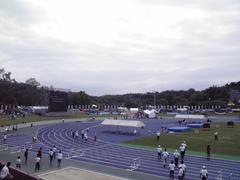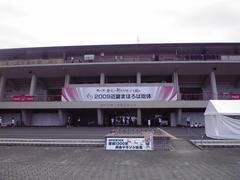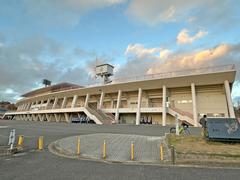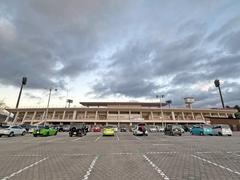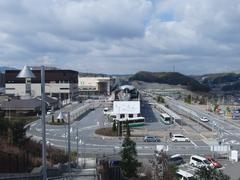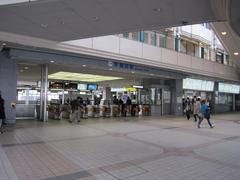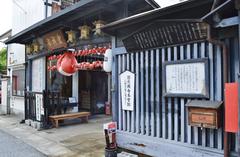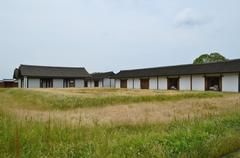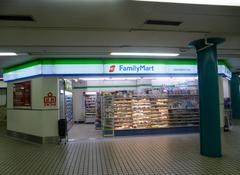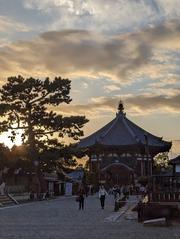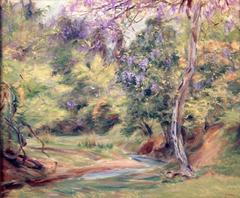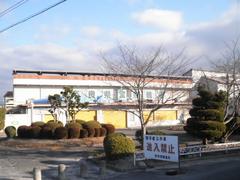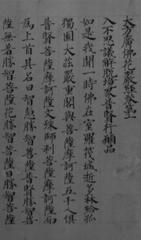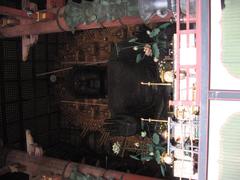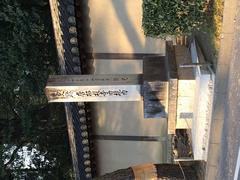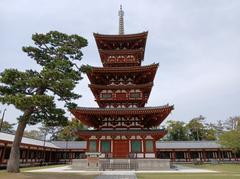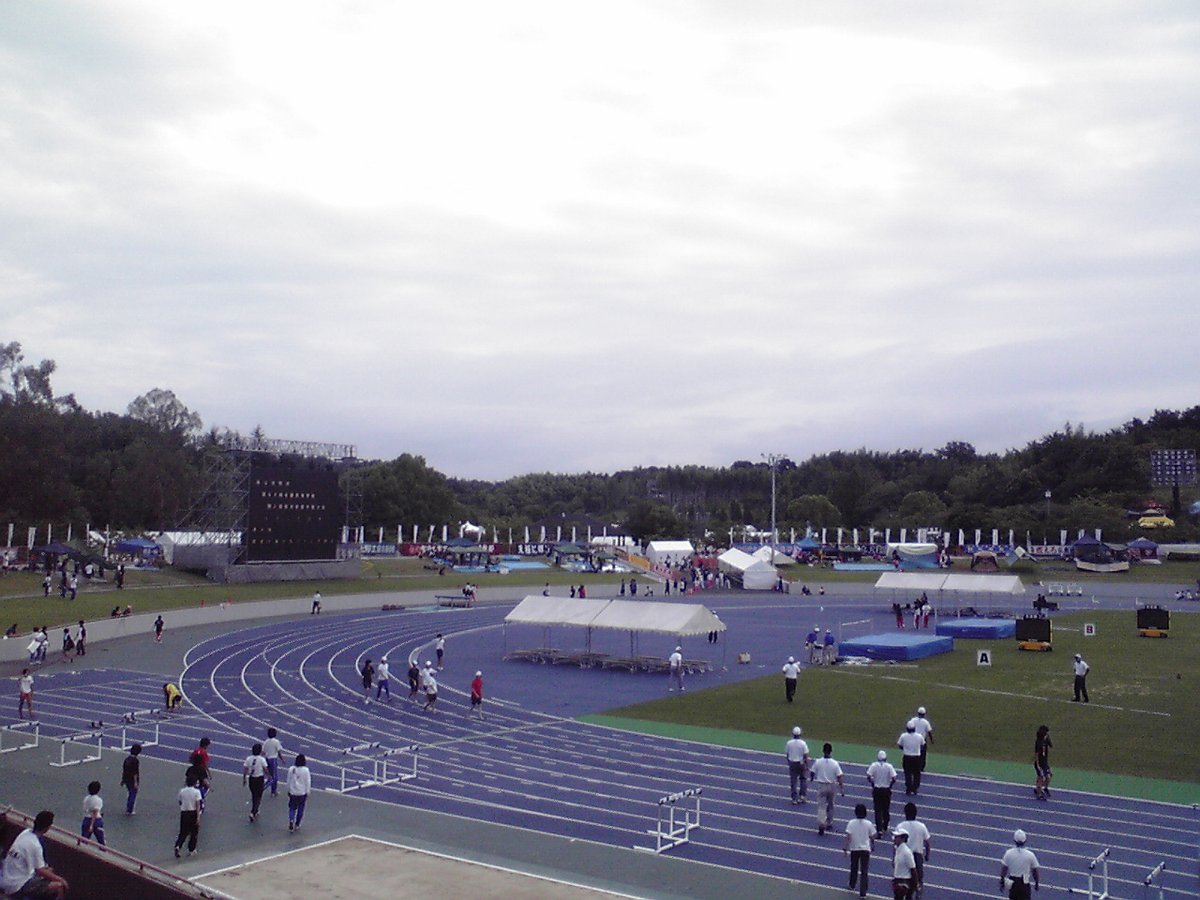
Kōnoike Athletic Stadium (Rohto Field Nara): Complete Visiting Guide, Tickets, and Cultural Highlights
Date: 15/06/2025
Overview
Kōnoike Athletic Stadium—currently known as Rohto Field Nara for sponsorship—is Nara Prefecture’s largest and most prominent sporting venue. Since its inauguration in 1983, the stadium has become a central hub for sports, community events, and cultural gatherings, reflecting Nara’s commitment to harmonizing its historic legacy with contemporary life. With a capacity of approximately 30,600, a standard 400-meter track, and a natural grass pitch, the stadium meets international standards and serves as the home ground for Nara Club, a J.League football team. Its location within the expansive Kōnoike Park complex places visitors near Nara’s most famous historical sites, making it an ideal destination for both sports fans and cultural explorers (NAVITIME JAPAN; Wikipedia).
This guide provides everything you need to know for a seamless visit, including ticketing, accessibility, transportation, visitor amenities, nearby attractions, and tips for integrating your stadium experience with Nara’s rich cultural offerings.
Table of Contents
- Introduction
- Stadium History and Significance
- Architectural Features and Facilities
- Visitor Information: Hours, Tickets, and Accessibility
- Transportation and Location
- Travel Tips and Nearby Attractions
- Cultural and Social Impact
- Major Events and Community Engagement
- Visual Resources and Media
- Frequently Asked Questions (FAQ)
- Conclusion & Call to Action
- Official Sources
Introduction
Kōnoike Athletic Stadium—Rohto Field Nara—stands as a beacon of modern sport and community life in the historic city of Nara. Whether you are attending a Nara Club match, participating in a festival, or planning a family day out, the stadium offers a blend of athletic excitement and cultural immersion. Its proximity to sites like Nara Park, Tōdai-ji Temple, and Kasuga Taisha Shrine allows visitors to create memorable itineraries that celebrate Nara’s past and present.
Stadium History and Significance
Constructed in 1983 as part of Nara’s initiative to expand public sports infrastructure, Kōnoike Athletic Stadium was envisioned as a venue that could accommodate both national competitions and local community events. Over the decades, it has hosted the National Sports Festival of Japan, numerous athletic meets, and high-profile football matches, evolving into a symbol of Nara’s modern identity and community spirit (NAVITIME JAPAN; Japan Travel).
Beyond its function as a sports venue, the stadium plays a vital role in local life—offering accessible facilities, supporting youth programs, and serving as a gathering point in times of community need.
Architectural Features and Facilities
- Design: Classic oval layout with an eight-lane, 400-meter synthetic running track and a natural grass pitch.
- Seating: Accommodates approximately 30,600 spectators; main stand is covered, the rest are open with panoramic views.
- Spectator Amenities:
- Multiple restrooms, including accessible facilities.
- Food and beverage kiosks offering Japanese snacks and local specialties.
- Merchandise stalls on event days.
- Accessibility: Ramps, elevators, designated wheelchair seating, and multilingual signage ensure inclusivity.
- Athlete Facilities: Spacious locker rooms, media center, and medical support available during events.
- Parking: Several hundred spaces onsite; fills quickly on event days.
Visitor Information: Hours, Tickets, and Accessibility
Visiting Hours
- Event Days: Gates typically open 1–2 hours before the start time.
- Non-Event Days: Public access may be limited or restricted. For tours or special access, check with the official website or Nara Club (National Stadium Tours).
Ticketing
- Nara Club matches and major events: Tickets are sold online, at the box office, and via Japanese convenience stores (Lawson, 7-Eleven).
- Pricing: Varies by event and seat category; discounts often available for children, seniors, and groups.
- Advance Booking: Recommended for popular events (Nara Club Official Site).
Accessibility
- Wheelchair Access: Ramps, elevators, and reserved seating.
- Restrooms: Fully accessible facilities.
- Assistance: Staff available to help; advance notice appreciated for special needs.
Transportation and Location
Getting to Nara
-
By Train:
- From Kyoto: JR Miyakoji Rapid Service (~45 min), or Kintetsu Limited Express (~35 min).
- From Osaka: Kintetsu Nara Line (~40 min), or JR Yamatoji Line (~50 min).
- From Tokyo: Shinkansen to Kyoto, then transfer.
-
By Air:
- Kansai International Airport (KIX) is ~90 minutes by train/bus.
- Osaka Itami Airport (ITM) also connects via bus/train (Visit Nara).
Getting to the Stadium
- From JR/Kintetsu Nara Stations:
- Bus: Frequent services by Nara Kotsu to Kōnoike Park area.
- Taxi: 10–15 minutes, ~1,000–1,500 yen.
- Bicycle: Rentals available at stations; 15–20 min ride.
- Walking: 2.5–3 km; feasible but weather-dependent.
Onsite Parking
- Car: Limited parking; early arrival crucial on event days.
- Bicycle: Ample bicycle parking.
Travel Tips and Nearby Attractions
Itinerary Sample
- Morning: Attend a stadium event or tour.
- Midday: Walk/bus to Nara Park—see the sacred deer.
- Afternoon: Visit Tōdai-ji Temple and Kasuga Taisha Shrine.
- Evening: Explore Naramachi historic district and enjoy local cuisine.
Nearby Attractions
- Nara Park: Famous for deer and open green spaces.
- Tōdai-ji Temple: UNESCO site with the Great Buddha.
- Kasuga Taisha Shrine: Renowned for lantern festivals.
- Museums: Nara National Museum, Prefectural Museum of Art (Matcha-JP).
Cultural Experiences
- Tea Ceremonies, Pottery Workshops, Sake Brewery Tours, Kyudo (Archery): Book in advance for immersive activities (Sarusawa-Nara).
Cultural and Social Impact
Kōnoike Athletic Stadium is a modern symbol of Nara’s unity, inclusivity, and evolving identity. It brings together people from all backgrounds for sports, festivals, and public events. The venue also fosters youth development, sustainability, and community resilience (Nara Prefecture).
Major Events and Community Engagement
- Nara Marathon: Annual highlight drawing thousands of runners and spectators (Agoda Events Guide).
- Nara Club Matches: Regular football games energize the local fan base.
- Festivals & Community Events: School sports days, concerts, and cultural festivals.
Visual Resources and Media
- Official websites offer virtual tours, high-quality images, and stadium maps.
- Descriptive photo tags such as “Kōnoike Athletic Stadium main stand” and “Nara Park deer” help enrich your digital albums.
- For an immersive preview, visit the Nara tourism website.
Frequently Asked Questions (FAQ)
Q: What are the stadium’s visiting hours?
A: Open during event days; for tours or off-event access, consult official schedules.
Q: How do I buy tickets?
A: Online, box office, or Japanese convenience stores. Advance purchase advised.
Q: Is the stadium wheelchair accessible?
A: Yes. Full accessibility features are in place.
Q: Are food and drinks available inside?
A: Yes, a variety of concessions operate during events.
Q: What other attractions are nearby?
A: Nara Park, Tōdai-ji, Kasuga Taisha, and more.
Q: Can I combine my visit with sightseeing?
A: Absolutely—proximity and transport make this easy.
Conclusion & Call to Action
Kōnoike Athletic Stadium (Rohto Field Nara) is more than a sports venue—it is a bridge between Nara’s vibrant present and storied past. With comprehensive amenities, accessible transport, and a unique location near UNESCO sites, the stadium invites you to experience the best of Nara’s athletic, cultural, and historical offerings. Plan your visit with the latest information from official sources, download the Audiala app for real-time updates, and follow our channels for travel inspiration. Discover the perfect fusion of history, community, and excitement at Kōnoike Athletic Stadium.
